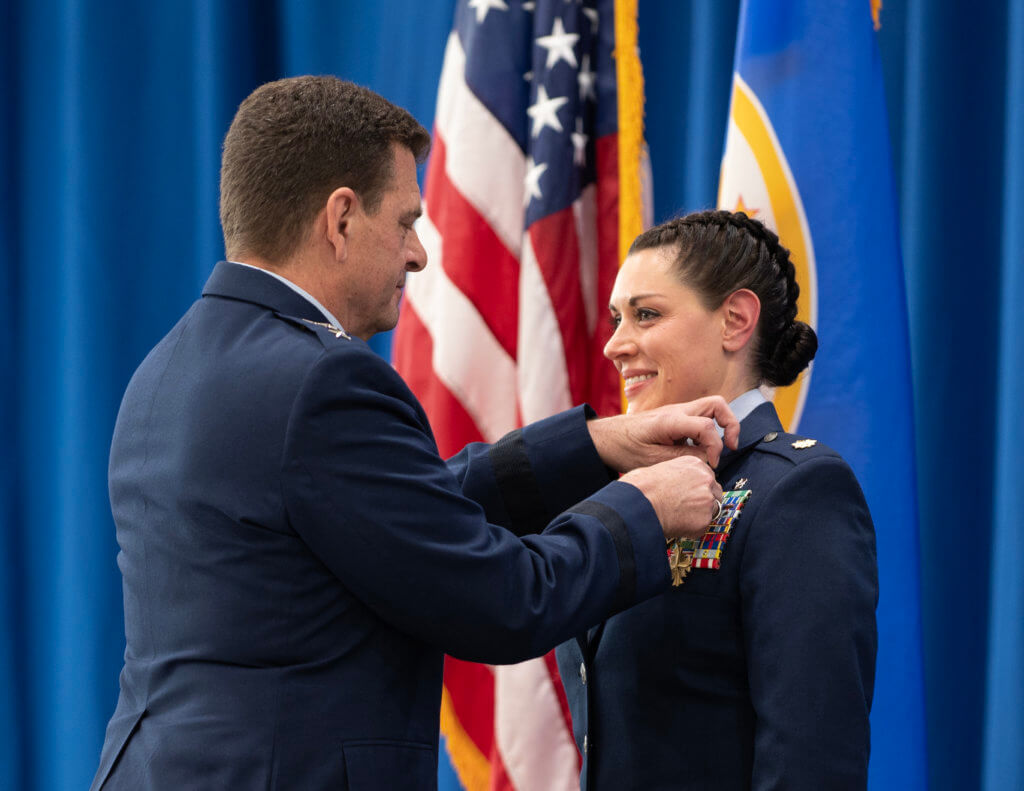A once-undecided high-school-graduate turned citizen airman recently became the second nurse in history to receive the Distinguished Flying Cross.
On Saturday, Air National Guard officer Maj. Katie Lunning received America’s oldest military aviation award for her “heroism or extraordinary achievement while participating in an aerial flight.”. The Minnesota native, 20-year guardsman and intensive care unit nurse manager, also is the first National Guard flight nurse to get the award, which is for her efforts on Aug. 26, 2021, during the evacuation of Afghanistan.
Within weeks of deploying to Afghanistan with the 379th Aeromedical Expeditionary Evacuation Squadron at Al Udeid Air Base in Qatar, Lunning received a phone call.
“I just got back from another mission and was getting ready [for] bed when my phone rang. It was my doc calling [to tell] me that there was an event, an explosion, and we needed to go back right then and there,” Lunning said.
Within minutes, she and her team headed into the night for a no-notice urgent combat mission.
As a flight nurse with a Critical Care Air Transport Team (CCATT), Lunning was prepared for almost anything.
“A bomb had gone off, so I was anticipating blast injuries, burn injuries, that sort of thing,” Lunning said.
The CCATT was unaware of whether those impacted would be service members or civilians. As with most casualty situations, “we really [had] no idea what we’re walking into,” Lunning said.
When her team arrived at the Hamid Karzai International Airport in Kabul, they encountered one of the deadliest attacks in Afghanistan. As U.S. troops and civilians prepared to leave Afghanistan, an Islamic State suicide bomber detonated explosives killing approximately 170 civilians and 13 U.S. service members and injuring countless others.
“When we landed in Kabul, we were concerned about the risk of additional attacks, but we focused on our jobs and what we can control,” Lunning said.
She credits the Air National Guard with giving her a “lot of opportunities to do trauma training, humanitarian missions and various assignments.”
Army Maj. Gen. Shawn Manke, who serves as Minnesota National Guard’s adjutant general, said Lunning’s “training and experience from her civilian nursing career served the nation and its partners.”
Amid small arms fire and with “significant and imminent threat of attack, Maj. Lunning’s exceptional leadership, dedication and medical expertise were pivotal to the medical evacuation of 22 multinational and joint service casualties, including five ventilated patients and multiple Afghan evacuees,” her award citation states.
As the CCATT team left Kabul for Landstuhl, Germany, Lunning recalled the extensive efforts necessary to keep everyone alive, especially the smallest victims.
“It was an eight-hour flight, so we were very busy, and we were worried about running out of supplies,” she said. “[Also], we don’t carry pediatric equipment, and we had an 18-month-old and a 7-year-old [patient] that we were caring for, so it was very challenging to make sure we were keeping them safe and caring for them with the lack of pediatric equipment.”
Per her citation, Lunning’s critical care experience enabled her to perform “in flight massive blood resuscitation of a critically wounded post-operative patient, emergent intravenous access in a 2-year-old patient with a traumatic brain injury who had developed a threatened airway, and obtaining intravenous access despite a lack of pediatric resources.”
For these efforts and more, Lunning’s Distinguished Flying Cross includes the “C” device, which “was established to distinguish an award earned for exceptionally meritorious service or achievement performed under combat conditions on or after Jan. 7, 2016.”
Saturday’s ceremony celebrated the punctuation of a four-month deployment. In addition to saving lives on that fateful day, Lunning also completed six combat missions, 11 sorties, 43.1 flight hours and 1,000 alert hours.

